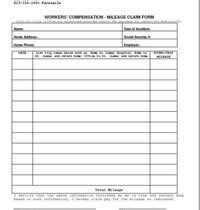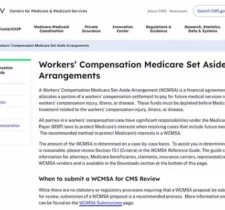Mileage Reimbursement in Florida Workers’ Compensation Cases
An injured worker[1] is entitled to Mileage Reimbursement in Florida Workers’ Compensation Cases for trips to and from treating providers and to the pharmacy. The current standard rate paid by workers’ compensation insurance carriers is .445 cents per mile.


In other words, if a longer route is used for some reason, the longer mileage can be used. However, it would be prudent to have a reasonable, good-faith explanation available as to why the longer route was required. As an example, maybe a road was closed or construction prevented travel through a certain, shorter-distance route.
History of Mileage Reimbursement
While the duty to reimburse travel is not currently laid out in the statute/Florida Workers’ Compensation Act, the Florida Supreme Court established that the right to Mileage Reimbursement in Florida Workers’ Compensation Cases is inherent in the employer/carrier’s duty to provide medical treatment.
“Considering the purposes of the Workmen’s Compensation Act and the benefits to be given injured employees by its terms, we conclude that travel expenses necessarily incurred in enjoying the medical benefits provided by the Act are an incident of medical care and treatment. Therefore, the employer-carrier must either furnish such transportation or pay claimant the reasonable actual cost thereof.” Mobley v. Jack & Son Plumbing, 170 So. 2d 41, 47 (Fla. 1964)
The duty to reimburse travel to and from the pharmacy for workers’ compensation medication was settled by the First DCA in 2006. Remington v. City of Ocala/United Self Insured, 940 So. 2d 1207, 1212 (Fla. Dist. Ct. App. 2006)
Amount of Mileage Reimbursement in Florida Workers’ Compensation Cases
F.S. 112.061 addressed travel expense of state employees. Specifically, “A traveler shall be entitled to a mileage allowance at a rate of 44.5 cents per mile”.
In the case of Mills v. Walden-Sparkman, Inc., 493 So. 2d 64, 65 (Fla. Dist. Ct. App. 1986), the court held that if the claimant seeks more than the amount allowed by the state to employees for official travel, the claimant must establish that the mode of transportation was reasonable and economical under the circumstances, taking into consideration the medical condition of the claimant.
Therefore, it is presumed that .445 is appropriate. If an injured workers seeks to deviate higher than that amount—to say the IRS rate for mileage—he/she would have to show evidence of the actual cost.
There have been challenges to the .445 per mile rate, but they are very few and far between. This is because of the type of evidence required to establish an amount higher than is often burdensome and impractical. As an example, in the case of Eva Rodriguez v. Miami Dade Transit Agency and Risk Management, OJCC# 07-031564, Order issued 11/13/2014, the claimant sought reimbursement at the rate of 56¢ per mile, the rate allowed by IRS. In support of her claim, claimant offered proof of her vehicle expenses, including gas, maintenance, and repair. The JCC was not persuaded and found the claimant did not demonstrate her actual costs exceeded the 44.5¢ amount paid by the employer/carrier. As such, the request for a higher amount was denied.
If you have questions regarding Mileage Reimbursement in Florida Workers’ Compensation Cases, or need to speak with a Tampa workers’ compensation lawyer, our attorney offers free consultations and will speak with you personally regarding your claim. You can schedule a time here, or call our office at 813-321-0426.
[1] This applies to claims under the Florida Workers’ Compensation Act.









